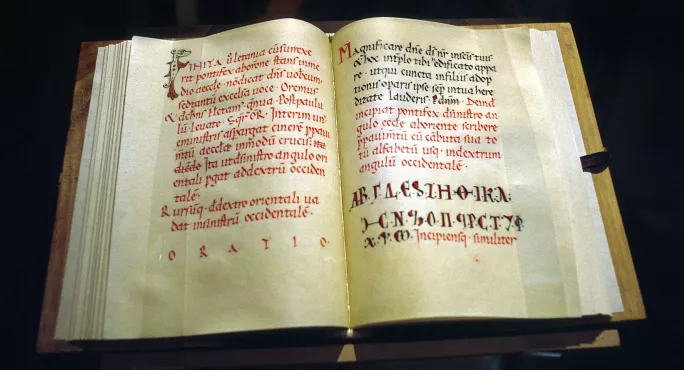How teachersŌĆÖ ŌĆśhinterlandsŌĆÖ could keep low-uptake subjects alive

If one thing has been proven by the Westminster governmentŌĆÖs axing of the , itŌĆÖs that keeping Classics alive in state schools has never been harder - and the threat to its existence never more real.
We are working through a period of what might be called educational austerity. School budgets have also been slashed repeatedly and as a consequence, so-called ŌĆ£minorityŌĆØ subjects are at risk of being cut altogether.
If a school faces a choice of offering German to a class of 20 or Latin to a class of 10, the cost of the class will usually make the decision.
Students thriving in low-uptake subjects
In Scotland in 2023-24, the following subjects all had fewer than 300 entries at Higher: fashion and textile technology, Italian, Gaelic, childcare and development, Urdu, Mandarin, care, Latin and Cantonese. But as the new record high in music uptake has shown, if you give kids a chance, theyŌĆÖll often grab it with both hands.
School leaders looking at spreadsheets and trying to make the sums work will very much have an eye on these subjects. This is despite all these subjects having value to the students who take them - possibly even greater value because of their scarcity.
More on languages in Scotland:
- How Latin aims to expand its reach in Scottish state schools
- Multi-level language classes ŌĆśchallengingŌĆÖ for Scottish teachers
- The decades-long retreat of languages from Scottish schools
I wrote for Tes some years ago about how state schools in Scotland could try to get Classical studies on to their course choice form for National 5; since 2016, the subjectŌĆÖs numbers have grown by 359 per cent. However, the numbers for Latin have remained stagnant.
We would do well to remind school leaders of this uptake for Classical studies when we argue for Latin. The data proves there is an appetite in school communities for these subjects.
The notes a responsibility for both ministers and education authorities to ŌĆ£reduce inequalities of outcome for students who experience those inequalities as a result of socio-economic disadvantageŌĆØ. Surely it is then incumbent on state schools to offer their students the same subjects as students in the independent sector?
If we are serious about equity, state schools should be funded to meet this bar, but even with an absence of funding, there is a duty to give students equal access. Yet, as recent research on failings in multi-level language-learning classes shows, the Scottish government is failing teachers and students in many ways.
It is the job of a school to help students discover their enthusiasms and enable them to pursue them. If we cut subjects, we immediately remove the possibility of children discovering whole disciplines of learning that might have fired their imaginations for a lifetime, which would be a tragedy. Against this backdrop, projects such as the St Andrews Latin Outreach Scheme are even more vital, but canŌĆÖt be expected to do the heavy lifting of government initiatives.
Where will the teachers come from?
With Latin - in Scotland, certainly - this becomes trickier because we know that there are no teacher-training opportunities for the subject. Where will the teachers come from?
School leaders would be surprised at the qualifications their existing staff have. A colleague of mine in chemistry received both Classical Greek and Latin up to the age of 17. Every school has staff with a hinterland that could be employed differently.
Relying on such staff may not be a long-term solution, but they could get the subject into the school and give state-school students the chance to choose it. They would also buy some time while Scotland decides whether to train any more Latin teachers.
There is no doubt that educational austerity is biting hard, and hits subjects with the lowest uptakes hardest. This is a crying shame because the numbers for Classical studies - driven by enthusiastic teachers of other subjects - prove that students often love these subjects.
In 2021, my partner and I founded Working Classicists, a vehicle to show that people from a state school background can have a deep and lifelong pleasure in the Classics.
Averting the road to ŌĆśdesolate curriculaŌĆÖ
Our latest attempt to show the value of the subject and the talent of its working-class participants is , a beginnersŌĆÖ guide to Greek mythology organised into a familiar table. Each ŌĆ£elementŌĆØ was written by a different writer, so in one volume more than 100 writers - 80 per cent of whom, crucially, received a state education - were given their first published space and encouraged to further their enthusiasm.
The hunger for this project, which , shows that when given the chance, people of all ages and backgrounds can develop a lifelong enthusiasm for Classics - or fashion and textile technology, Italian, Gaelic, childcare and development, Urdu, Mandarin, care and Cantonese.
ItŌĆÖs about time our education authorities understood that ŌĆ£the market will decideŌĆØ is a quick route to desolate curricula.
George Connor is a Classical studies and English teacher in Scotland. He posts on
For the latest in Scottish education delivered directly to your inbox, sign up for TesŌĆÖ The Week in Scotland newsletter
Register with Tes and you can read two free articles every month plus you'll have access to our range of award-winning newsletters.
Keep reading with our special offer!
YouŌĆÖve reached your limit of free articles this month.
- Unlimited access to all Tes magazine content
- Save your favourite articles and gift them to your colleagues
- Exclusive subscriber-only stories
- Over 200,000 archived articles
- Unlimited access to all Tes magazine content
- Save your favourite articles and gift them to your colleagues
- Exclusive subscriber-only stories
- Over 200,000 archived articles
topics in this article



